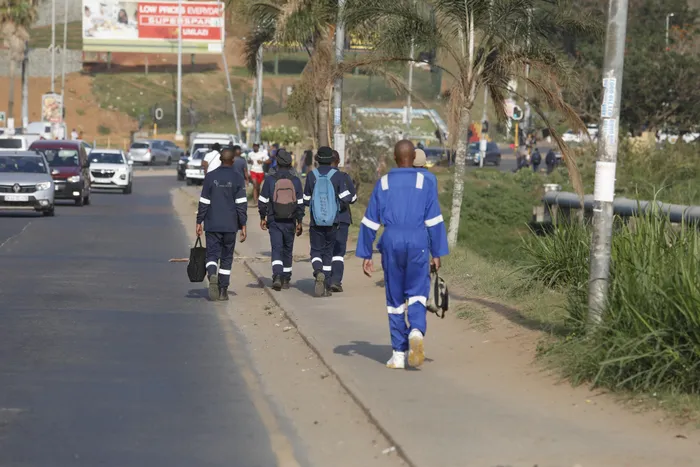Santaco urges study on taxi permit issues in Durban as task team formed to address grievances

Several workers were left stranded on Thursday due to a taxi strike in Durban.
Image: DOCTOR NGCOBO / Independent Newspapers
While the Durban taxi strike was called off late on Thursday night, the business community and an economic expert raised concern about the debilitating impact the strike.
With the main issue being around operating licences, the SA National Taxi Council (Santaco) yesterday called on the eThekwini Municipality to conduct a study to determine the exact number of taxis operating in the city.
Sifiso Shangase, the provincial spokesperson for Santaco, made this request amid a crippling strike by taxi operators in Durban on Thursday.
The taxi operators halted their services to protest against the government over the impounding of taxis by eThekwini metro police, as well as the City’s failure to recommend the issuance of operating permits.
The provincial government, eThekwini Municipality, and Santaco have held marathon meetings over the past two days in an attempt to resolve the strike.
Late last night, KZN MEC for Transport Siboniso Duma told SABC News in a briefing that the taxi operators had agreed to halt the strike. It was revealed that the parties had agreed to establish a task team to address daily challenges within the transport sector.
Mathula Mkhize of the eThekwini Metro Taxi Council said they had agreed to the formation of a task team that will work on a daily basis, addressing teething matters that affect the transport sector.
“We want to clarify our perspective on other means of transport; we respect them. The strike is off; what is on is the work of the task team.”
The business community and economic experts have warned of the debilitating impact the strike could have on the economy. However, one expert suggested that the economic recovery would be swift, as disruptions like these have become a regular occurrence.
Shangase highlighted inefficiencies within the municipality regarding the management of the process around the issuing of operating licences. “The eThekwini Municipality does not issue licences; it is the Department of Transport that does so. However, the city recommends, and currently, they are not making recommendations due to market saturation,” he said.
“Several problems contribute to this situation, chief among them being an outdated database. For instance, if you sell your car and buy a new one, then the new car is listed above the old car in the database, which makes it look like you have many cars (taxis), which is the basis upon which they say it is full, and they are not recommending the issuance of more licences.”
Shangase said they wanted a study to be conducted to determine how many vehicles are on each route and whether there is saturation of the market. “This study would also look at the areas from which people are being transported to determine whether the routes are still profitable.”
“This situation is a painful strike; it is hurting everyone,” Shangase said. “I say this because I know that even the taxi owners are hurting. There were discussions on Wednesday and others scheduled yesterday, but we are still at a stalemate.”
Durban commuters told The Mercury how the strike had impacted them. Precious Sithole, from the Durban CBD, said she had an interview in uMhlanga and had to use an e-hailing service which cost significantly more yesterday due to the strike. “I had to borrow money from a friend because the prices (for e-hailing) went very high today. I ended up being late as well because I couldn’t find a ride on time.”
Another commuter from KwaMashu, Phindile Mtshali, said she struggled to find a bus to take her to work. “We had to walk to another section (in KwaMashu) where we would find buses because buses were not coming into our area. Maybe like two hours later we found the buses, but (they were) packed. People were standing; it was just a mess.”
Economist Dawie Roodt commented that the taxi industry is one of the most successful sectors in South Africa and is extremely important for the economy.
“Unfortunately, they have become a force unto themselves and can disrupt the economy significantly through strikes, as we are currently witnessing. They have become the tail wagging the dog; they must adhere to the rules and cannot be allowed to disrupt the economy to this extent. This is costing the economy dearly, and the local economy will be disrupted by the strike.”
Despite the challenges, Roodt believes that the country’s economy has become adept at enduring disruptions like this and will recover soon.
Palesa Phili, CEO of the Durban Chamber of Commerce and Industry, expressed deep concern about the taxi strike.
“While we acknowledge the concerns raised by Santaco regarding permits and the impoundment of vehicles, as organised business, we believe that the disruption to transport services has had a significant impact not only on employees who rely on public transport but also on business operations.
“Although the full extent of losses is still to be determined, staff shortages, hampered productivity, and lost income for both employees and businesses are major concerns. Informal and small businesses are particularly at risk. If the strike is not resolved before the weekend, it will adversely impact our economy, worsening financial pressures not only for workers and businesses but also impacting business confidence in eThekwini,” she said.